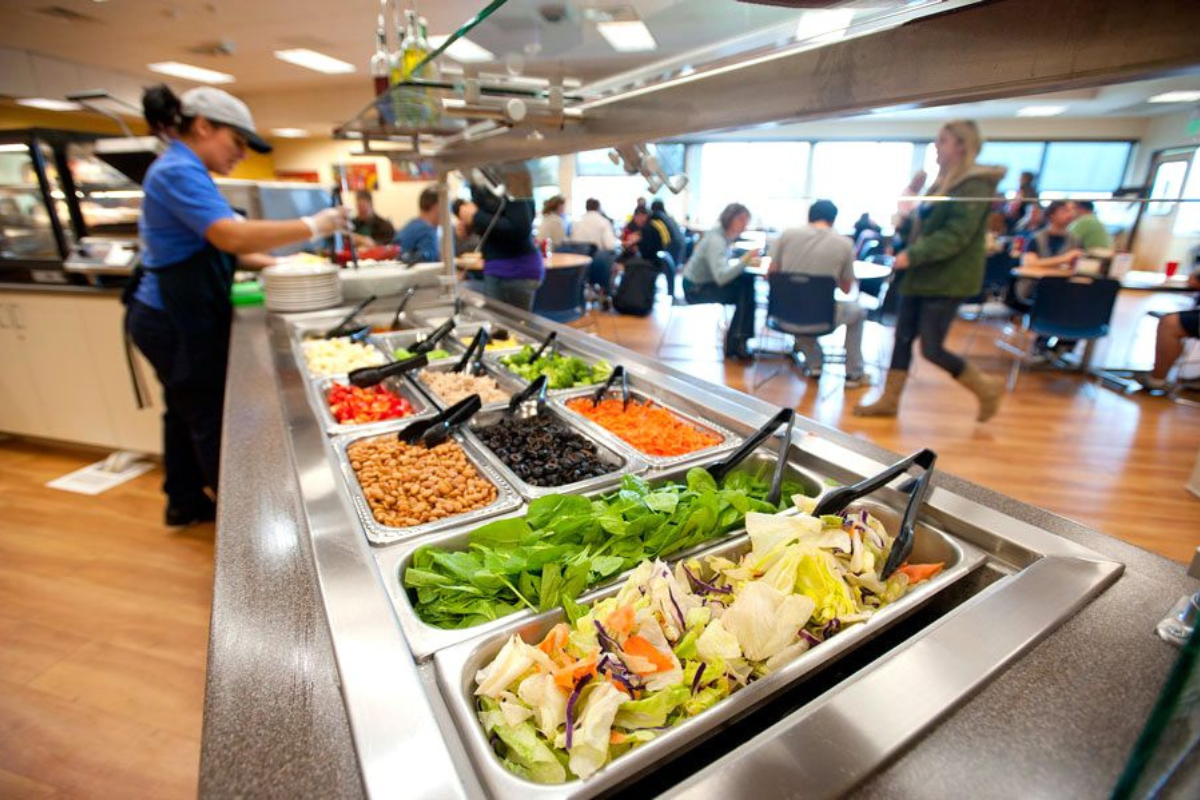Friends of Animals wants to overhaul the meat-centric, cheese-heavy National School Lunch Program by getting daily vegan entrée options in an increasing number of public-school cafeterias and to get them highlighted on school menus.
The organization’s initial efforts have been successful. After weeks of conversations between FoA and food services staff in Norwalk, Connecticut, as of November all Norwalk Public Schools—which is comprised of nearly 12,000 students—will have a daily vegan lunch entrée, including items such as hummus, chik’n nuggets, sweet and crunchy chickpea wraps, and Impossible beef crumbles and burgers.
Having daily vegan lunches available is astoundingly good news for animals and the environment. A vegan Beyond Burger generates 90% fewer greenhouse gas emissions, requires 46% less energy, has 99% less impact on water scarcity and 93% less impact on land use than a quarter pound of U.S. beef. That means a 41-square-foot plot of land can produce just one beef burger for every 15 Beyond Burgers.
Not to mention, vegan food is more inclusive!
If you would like to take action and encourage your local school district to include more vegan options, we’ve included a suggested outline to follow and an example letter that we’ve sent to Fairfield Public Schools below.
- Introduction
- Explain initiative briefly
- State observations on the menu and then include a couple of follow up questions to make it feel more personalized.
- Solidify the pitch by touching on equity and educational components and then include climate change stats.
- End it by clearly stating “mark these already available vegan options with a VE, and to expand the vegan options to satisfy our one-entrée-per-day request”
- Thank them, include contact info to follow-up.
Dear Dawn Carr,
My name is Jack Keller and I’m the communications assistant at Friends of Animals (FoA). We’re an international animal advocacy group based in Darien.
I’m reaching out about the lunch options currently available in your schools. FoA is currently imploring school districts all over Connecticut to offer a daily vegan entrée, and we’d like to request that Fairfield joins these efforts.
We’re headquartered in Darien and have been prioritizing local school districts to start our campaign. Norwalk was the first district to join our esteemed ‘Gold Standard’ list, and districts like Middletown, New Canaan, Westport, and Darien have since followed suit. Some districts are easier to convince than others. In fact, I’ve specifically targeted Fairfield because the offerings your district currently has are quite promising.
Here are a few quick observations I had after reviewing your December 2024 menus:
You offer vegetarian options on a daily basis and clearly label these options as vegetarian.
Your menu descriptions are quite thorough, which is terrific in regards to transparency.
There are plenty of options.
Going off those observations, here are a few quick questions that jump to mind:
- Can any of your daily vegetarian options be made vegan?
- Are there any other daily offerings that aren’t listed?
If the answer to my “can this also be made vegan” question is a yes, then maybe you can consider introducing a ‘VE’ symbol—to indicate that this is a vegan option—to your menus. Clearly dignifying each vegan option with a VE would satisfy much of what we’re looking for—every bit of transparency helps.
Furthermore, if the answers to those questions are “no,” then maybe you can consider introducing a daily vegan offering or amend your daily vegetarian offerings to be vegan.
Expanding and clearly identifying vegan options is not just a menu improvement—it’s a step toward promoting equity and environmental justice. By offering daily vegan options, schools can ensure that students with ethical, environmental, or cultural dietary preferences are included, while also addressing the urgent need to reduce the environmental impact of food production.
A revised menu would have an educational component since animal farming generates more greenhouse gas emissions (methane) measured in carbon dioxide—18 percent—than transportation, and concern about the climate crisis is everyone’s call to action. Sharply reducing greenhouse gas emissions is an imperative. Aside from the animal cruelty of serving mostly meat-based foods, the slaughtering of 1.3 billion pigs, 33 million cows, and more than 8 billion chickens in the U.S. each year contributes to our climate crisis and to public health problems, so the offerings we’re making to students matters now and for their future.
While a vegetarian diet is certainly more beneficial than one predicated on meat consumption, it still doesn’t go far enough as animal products are still being consumed; meaning that many of the same environmental, ethical and health concerns raised by a meat-based diet can also be raised by a vegetarian one.
Please consider our requests to mark these already available vegan options with a VE, and to expand the vegan options to satisfy our one-entrée-per-day request.
Additionally, I’d love for the opportunity to speak with you about this further and to answer any questions you may have. I can be reached by replying to this email, or via phone at (203) 656-1522 Ext. 2136.
I’m grateful for your consideration and concern for this matter.
Sincerely,
Jack Keller

